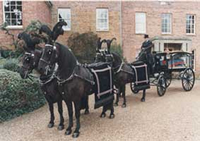Welcome To John White Funeral Directors
188/190 Watling Street East, Towcester, Northants. NN12 6DB.
Telephone : 01327 359266 Fax : 01327 359717 E-Mail : mail@johnwhitefunerals.co.uk

The firm's main aim is to provide a friendly, personal, efficient and independent service at a particularly difficult time for all families and relatives catering for all that might be required.
We’re here to help you
When a death occurs in the family, whether it be at home or in hospital, there are many unfamiliar tasks which must be carried out at such a time, when natural grief and perhaps anxiety weigh heavily upon you, you will need to rely on the advice and guidance of professionals.
One of those with whom you will undoubtedly deal with is the Funeral Director. This information has been prepared to assist you in your choice, and to provide answers to some of the questions which may arise.
- We are Independent family owned.
- We offer 24 hour service.
- Private chapel of Rest.
- Direct Cremations available.
- Golden Charter pre-payment plans available.
What to do when a death occurs?
At Home
Contact your Doctor (or the Doctor on duty) who will certify that death has taken place and, if he or she is able, issue a death certificate. These days most families prefer that the deceased is conveyed to the Funeral Directors Chapet of Rest at an early stage and this can be arranged at any time of the day or night by telephone.
At a Nursing or Residential Home
The above procedure is likely to have been carried out, with your permission, by the Matron or Warden who will advise on the whereabouts of the death certificate.
In Hospital
The nursing staff or the appropriate officer will advise you when and from where to collect the death certificate. In all cases the Death Certificate must be taken to the Registrar of Births, Deaths and Marriages for official record purposes.
Registration
A death must be registered by law in the District in which the death occurs. Your Funeral Director will advise you of the whereabouts and opening times of the relevant office and can assist with times the registrar is in attendance. Under normal circumstances the Death Certificate should be taken to the Registrar with, if possible, the deceased’s Medical Card.
Who can register the Death?
- Any relative of the deceased.
- Any person present at death.
- The occupier of the house where the death occurred.
- The person arranging the funeral (NOT the Funeral Director).
The procedure for registering a death is a simple interview with the Registrar who will require the following information:
- Date and place of Birth and Death.
- The full name of the deceased.
- Home address of the deceased.
- The marital status of the deceased.
- The occupation (if any) of the deceased.
- If the deceased is female, her maiden name and her husband’s full name and occupation.
- The Registrar will issue a Green Certificate which should be handed to your Funeral Director as soon as possible.
- Copies of the Entry of Death (often known as Death Certificates) maybe obtained from the Registrar upon payment of the appropriate fee and will be required for Insurance purposes, probate, bank accounts, private pension schemes, National Savings Certificates, Premium Bonds, etc.
H.M. Coroner
There are a number of reasons why a death may have to be referred to the Coroner and under such circumstances special procedures may be necessary. However, these should not give cause for any undue alarm.
The Coroner is a judicial officer, quite independent of local and central government, who is required to act, in accordance with certain laws. Any sudden or unexplained death must be reported to the Coroner whose duty it is to ascertain the cause of death, and to investigate any unusual circumstances if any.
Sometimes the Coroner may be able to ascertain by simple enquiry whether the death was due to natural causes and that there is a Doctor able to issue a death certificate. The death is then registered adopting the procedures shown under ‘Registration’ If this not the case the Coroner may require a post mortem examination.
This will usually indicate that the death was due to natural causes and in such cases there is no inquest. The Coroner sends a certificate to the Registrar so that the death can be registered. If cremation has been selected the Coroner will issue an additional certificate to the Funeral Director.
If the death is not due to natural causes (for example, a traffic accident) the Coroner is obliged to hold an inquest. This is an enquiry and its purpose is to determine:
- The identity of the deceased
- When, where and how the death occurred
- The cause of death
Following the Inquest the Coroner will issue a certificate for burial or cremation. In certain cases he may adjourn the Inquest after having established the above mentioned facts. A certificate will then be issued to enable the funeral to take place and the Inquest reopened, sometimes after several weeks, in order to gather relevant information relating to the death.
Your Funeral Director is fully conversant with the likely causes for referral to the Coroner and will be able to advise you of any action that may be necessary.
